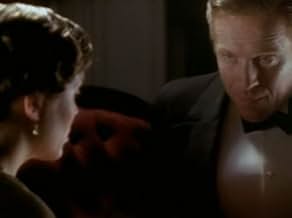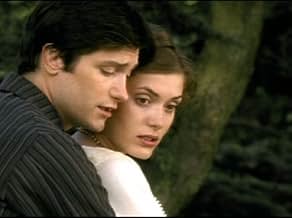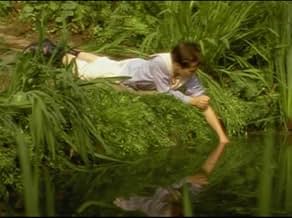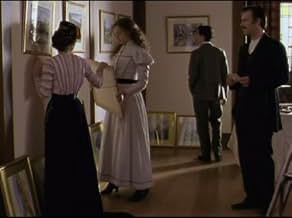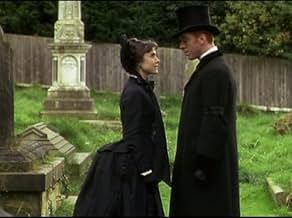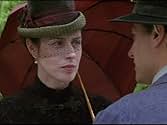Adicionar um enredo no seu idiomaChronicles the lives of three generations of the upper-middle-class British family, the Forsytes, from the 1870s to 1920.Chronicles the lives of three generations of the upper-middle-class British family, the Forsytes, from the 1870s to 1920.Chronicles the lives of three generations of the upper-middle-class British family, the Forsytes, from the 1870s to 1920.
- Ganhou 1 prêmio BAFTA
- 2 vitórias e 4 indicações no total
Explorar episódios
Avaliações em destaque
The first series was so well wrought that I rushed out to buy the books, a set of three trilogies! As did the first, this second series brings the characters and story lines to life as though Galsworthy himself crafted the script. Once again, we trace the intertwined lives of Soames, Irene, Jolyon and their families as they mature and branch out. Damien Lewis builds upon his masterful portrayal of Soames, an emotionally repressed man bound by Victorian conventions, whilst others around him, including the irrepressible Freddie, enjoy the heady excitement of the decidedly unstuffy post-war era. I found most characters "aged" convincingly, although time, if not her fashionable appearance, seems to have stood still for June who now looks about the same age as her much younger sister, Holly. Overall, the continuity between the first and second series has been handled well. Much of the action in the books has been condensed whilst still remaining true to the plot (the same things happen, just not as drawn out). I am really enjoying the new characters who have been introduced: Jon, Fleur, Prosper Profond and Michael Mont. The actors are well cast and have done a marvellous job; the audience really cares what happens to them, regardless of whether we like them or not. None is all bad or all good, and we recognise our own human virtues and frailties in reflection.
A remake of the 1967 original, the 2002 mini-series boasts some fine performances, especially from Band of Brothers' Damian Lewis as the often unfeeling Soames Forsyte, and Gillian Kearney as June Forsyte (the graveyard scene between these two characters is superb!)
The story follows three generations of the Forsyte family, from about the 1880s to the death of Queen Victoria. There is a nice blend of humour, action, and drama to keep the viewer interested in the proceedings. If you're like me and into family sagas, I recommend watching this, or, if you can't, reading the book by John Galsworthy.
The story follows three generations of the Forsyte family, from about the 1880s to the death of Queen Victoria. There is a nice blend of humour, action, and drama to keep the viewer interested in the proceedings. If you're like me and into family sagas, I recommend watching this, or, if you can't, reading the book by John Galsworthy.
Comparisons between the 60s version of this splendid work and the latest one are difficult because they were both great. I have really enjoyed the last version especially as regards the performances of Damian Lewis and Gina McKee.
One previous contributor said that he found himself almost liking Soames which 'we were not supposed to do'. Is that right? Galsworthy intended The Forsytes to be representative of the upper middle class with some bad aspects - arrogance, lack of sentiment, conscious always of their respectability - but also with a positive side - sturdy, determined, ambitious, but ultimately concerned with ownership and property. Soames is an extreme example of his kind, to the extent that he regards people - especially his wife - as potential property. Irene, on the other hand, represents the new force which, along with the effects of WWI and the rise of the Welfare State, nationalisation etc will soon overthrow the old order.
Superficially at least, Soames is the villain. He appears to terrorise his wife, physically abuses her and more. However, is there another side to this? Irene marries him quite cynically for materialistic reasons. It's not merely a question of 'not loving' him. He positively makes her flesh creep right from the start. We are given the idea that she is forced to marry him by her stepmother and by her poverty. Force her?? As the story goes forward, we see that she is a strong character - no-one can force her to do anything. Her poverty? She has £50 per annum from her father. This might not seem a lot, but it was about what an artisan earned in a year at that time (on which he was expected to keep a family). Despite his treating her as property, Soames does love Irene in his way and he does try his best to give her what she wants. In return she is openly unfaithful to him, denies him children and even conjugal rights. As regards his bad treatment of her, she certainly returns the compliment in kind. She could be looked on as something of a vampire - she sucks the life force from Soames and old Jolyan and wantonly destroys the happiness of her friend June and Bossiney (though admittedly he goes along willingly). As regards her own son her hatred of Soames tempers her dislike of Fleur so even her son is badly affected by her force of character and neurosis.
I think Galsworthy, as well as writing a simple commentary on Edwardian and Victorian life was also trying to divide his readers into factions - the pro-Soames camp who like the old ways, and the pro-Irene (the 'new woman' camp) who wanted change.
Whatever, I have to congratulate Gina McKee. She carried off that complex character of Irene so well. Her enigmatic Mona Lisa smile, did it display goodness? Or the opposite? I'm still not sure
One previous contributor said that he found himself almost liking Soames which 'we were not supposed to do'. Is that right? Galsworthy intended The Forsytes to be representative of the upper middle class with some bad aspects - arrogance, lack of sentiment, conscious always of their respectability - but also with a positive side - sturdy, determined, ambitious, but ultimately concerned with ownership and property. Soames is an extreme example of his kind, to the extent that he regards people - especially his wife - as potential property. Irene, on the other hand, represents the new force which, along with the effects of WWI and the rise of the Welfare State, nationalisation etc will soon overthrow the old order.
Superficially at least, Soames is the villain. He appears to terrorise his wife, physically abuses her and more. However, is there another side to this? Irene marries him quite cynically for materialistic reasons. It's not merely a question of 'not loving' him. He positively makes her flesh creep right from the start. We are given the idea that she is forced to marry him by her stepmother and by her poverty. Force her?? As the story goes forward, we see that she is a strong character - no-one can force her to do anything. Her poverty? She has £50 per annum from her father. This might not seem a lot, but it was about what an artisan earned in a year at that time (on which he was expected to keep a family). Despite his treating her as property, Soames does love Irene in his way and he does try his best to give her what she wants. In return she is openly unfaithful to him, denies him children and even conjugal rights. As regards his bad treatment of her, she certainly returns the compliment in kind. She could be looked on as something of a vampire - she sucks the life force from Soames and old Jolyan and wantonly destroys the happiness of her friend June and Bossiney (though admittedly he goes along willingly). As regards her own son her hatred of Soames tempers her dislike of Fleur so even her son is badly affected by her force of character and neurosis.
I think Galsworthy, as well as writing a simple commentary on Edwardian and Victorian life was also trying to divide his readers into factions - the pro-Soames camp who like the old ways, and the pro-Irene (the 'new woman' camp) who wanted change.
Whatever, I have to congratulate Gina McKee. She carried off that complex character of Irene so well. Her enigmatic Mona Lisa smile, did it display goodness? Or the opposite? I'm still not sure
I came across "The Forsyte Saga" and its sequel, "The Forsyte Saga: To Let," in my local library. It was the sequel that I had watched first, not realizing there had been a mini-series made prior to this. THE FORSYTE SAGA is an utterly brilliant film, in my opinion, ranging from the exceptional performances of the actors (notably Rupert Graves, Damian Lewis, Gina McKee, Gillian Kearney, & Corin Redgrave), to the screenplay, to the cinematography, to the music (closing theme). The actors executed their portrayals with such realism that I was engrossed in the mindsets of the major players in the film. Such performances are refreshing in the movie industry, as one loses sight of the actors for the "characters." The plot was very good and well written; as such, the movie never seemed to drag. For me, this drama evoked powerful emotions ranging from: deep sorrow & loss (Old Jolyon), to empathy & sympathy, and even a few moments of unexpected humour. I kept wanting more. All in all, this miniseries shows us many injustices, and that dignity, integrity, goodness, and compassion can prevail. If you can set aside an afternoon or long evening to relax and watch the miniseries in one sitting, it will be worth savouring. I hope others find THE FORSYTE SAGA to be a pleasure to watch. I certainly plan to add the DVD set in my film library soon.
10ids
This second installment lives up to the expectations created by the first series and by the novel itself - To Let. We meet again, with much pleasure, the magnificent cast of the first series (D. Lewis as Soames stands out) and discover the choices that have been made to cast the 4 new main characters : Fleur and Jon Forsyte, Prosper Profound, and Michael Mont. I found the 4 of them to be nearly-ideally suited to their part. May be the actor playing Jon lacked a little bit of brilliance, but he showed a lot of sensibility and looked a lot like his "mother", Irene. The story unfolds with relentlessness but there are also many moving, or funny moments. The films is really faithful to the tone of Galdsworthy and is, all in all, a magnificent achievement. it is as good as the first series, and may be even better. At the end of the 4th episode, we are really sorry to have to wait for the next episodes of the saga, and the lives of Fleur and Michael Mont. Highly recommended to fans of British top quality literary drama.
Você sabia?
- CuriosidadesThe series as it is shown on Amazon Prime divides Season One into eight of approximately 55 minute each, and Season Two into five episodes. Whereas, it was originally shown as six episodes for Season One, and four episodes in Season Two.
- Citações
Soames Forsyte: You know nothing about it. Your friendship with her was a sham!
June: Yes! She stole the love of my life, my future. I should hate her but the alternative was you. I cannot hate her. I can only wonder why she did not do it sooner.
- ConexõesFeatured in The Best of Masterpiece Theatre (2007)
- Trilhas sonorasIrene's Song
(End titles music)
Music by Geoffrey Burgon
Lyrics by Jacqueline Kroft
Performed by Bryn Terfel
Principais escolhas
Faça login para avaliar e ver a lista de recomendações personalizadas
- How many seasons does The Forsyte Saga have?Fornecido pela Alexa
Detalhes
- Data de lançamento
- País de origem
- Centrais de atendimento oficiais
- Idioma
- Também conhecido como
- The Forsyte Saga
- Locações de filme
- Croxteth Hall, Muirhead Avenue East, West Derby, Liverpool, Merseyside, Inglaterra, Reino Unido(James and Emily's home)
- Empresas de produção
- Consulte mais créditos da empresa na IMDbPro
Contribua para esta página
Sugerir uma alteração ou adicionar conteúdo ausente

Principal brecha
What is the Brazilian Portuguese language plot outline for A Saga da Família Forsyte (2002)?
Responda







